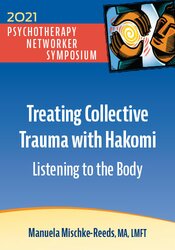
Trending Topics:
×

The Hakomi Method is a multidimensional somatic approach to deep healing rooted in an understanding of the silent language of the body. In the moment-by-moment unfolding of their somatic awareness, clients learn to access the unconscious core beliefs that shape their response to trauma, even when it’s woven within the larger context of collective trauma. Discover how the therapist’s own somatic awareness can help clients untangle the complex area where individual and collective trauma meet, and learn techniques to stay attuned and somatically grounded to effectively work with trauma. In this recording, you’ll explore:
All members of the PESI, Inc. planning committee have provided disclosures of financial relationships with ineligible organizations and any relevant non-financial relationships prior to planning content for this activity. None of the committee members had relevant financial relationships with ineligible companies or other potentially biasing relationships to disclose to learners. For speaker disclosures, please see the faculty biography.
NOTE: Tuition includes one free CE Certificate (participant will be able to print the certificate of completion after passing the online post-test (80% passing score) and completing the evaluation). Instructional methods will include PowerPoint, didactic lecture, and others.
Continuing Education Information: Listed below are the continuing education credit(s) currently available for this non-interactive self-study package. Program content is reviewed periodically per accrediting board rules for currency and appropriateness for credit. Credit approvals are subject to change. Please note, your licensing board dictates whether self-study is an acceptable form of continuing education, as well as which credit types are acceptable for continuing education hours. Please refer to your licensing board's rules and regulations. If your profession is not listed, please contact your licensing board to determine your continuing education requirements and check for reciprocal approval.
For other credit inquiries not specified below, please contact info@pesi.com or 800-844-8260 before purchase.
Materials that are included in this course may include interventions and modalities that are beyond the authorized practice of your profession. As a licensed professional, you are responsible for reviewing the scope of practice, including activities that are defined in law as beyond the boundaries of practice in accordance with and in compliance with your profession's standards.
For Planning Committee disclosures, please see the statement above. For speaker disclosures, please see the faculty biography.
Earn up to 2.0 CE hours. Please see below, for more details, as credit amounts vary by jurisdiction and profession.
PESI, Inc. is approved by the Canadian Counselling and Psychotherapy Association to offer continuing education for counsellors and psychotherapists. PESI, Inc. maintains responsibility for the program. This self-study activity is approved for 2.0 credit hours.
This self-study activity qualifies for 2.0 continuing education clock hours as required by many national and local licensing boards and professional organizations. Save your activity advertisement and certificate of completion, and contact your own board or organization for specific requirements.
| File type | File name | Number of pages | |
|---|---|---|---|
| Manual - Treating Collective Trauma with Hakomi (5.5 MB) | 17 Pages | Available after Purchase | |
| Text Document | Transcript (89.5 KB) | 21 Pages | Available after Purchase |
| Manual - Treating Collective Trauma with Hakomi - French (5.5 MB) | 17 Pages | Available after Purchase | |
| Manual - Treating Collective Trauma with Hakomi - Italian (5.5 MB) | 17 Pages | Available after Purchase | |
| Manual - Treating Collective Trauma with Hakomi - German (5.5 MB) | 17 Pages | Available after Purchase | |
| Manual - Treating Collective Trauma with Hakomi - German (5.5 MB) | 17 Pages | Available after Purchase | |
| Manual - Treating Collective Trauma with Hakomi - Spanish (5.5 MB) | 17 Pages | Available after Purchase | |
| Manual - Treating Collective Trauma with Hakomi - Spanish (5.5 MB) | 17 Pages | Available after Purchase |

Manuela Mischke-Reeds, MA, LMFT, CHT, is a somatic psychotherapist, international teacher of Somatic Psychology, author and consultant. She is the founder of Embodywise and co-director of Hakomi California. She trains and consults professionals in varied fields, including health professionals and business leaders. Her trainings in the United States, Australia, Germany, China and Israel bring together 25 years in-depth clinical practice and teaching. She integrates Hakomi Mindful somatic Psychotherapy, Somatic trauma therapies, embodied mindfulness practices and movement therapies.
Manuela is the founder of ISITTA trauma training. Her trauma teachings are grounded in an inside-out approach that utilizes the depth of the body’s innate healing capacity.
Manuela is the author of several books, including 125 Somatic Psychotherapy tools for Trauma and Stress (PESI 2018), 8 Keys to Practicing Mindfulness: Practical Strategies for Emotional Health and Well Being (W.W. Norton 2015). Visit Manuela’s website to find out more about her work: www.embodywise.com.
Speaker Disclosures:
Financial: Manuela Mischke-Reeds is the founder of Embodywise and has an employment relationship with Embodylab. She receives compensation as a consultant and royalties as a published author. She receives a speaking honorarium, recording, and book royalties from PESI, Inc. She has no relevant financial relationships with ineligible organizations.
Non-financial: Manuel Mischke-Reeds has no relevant non-financial relationships.
Access never expires for this product.
Visit our FAQ page at https://www.pesicanada.com/faq or contact us at https://www.pesicanada.com/contact-us
| 5 |
|
| 4 |
|
| 3 |
|
| 2 |
|
| 1 |
|
Satisfaction Guarantee
Your satisfaction is our goal and our guarantee. Concerns should be addressed to info@pesicanada.com.
Please wait ...